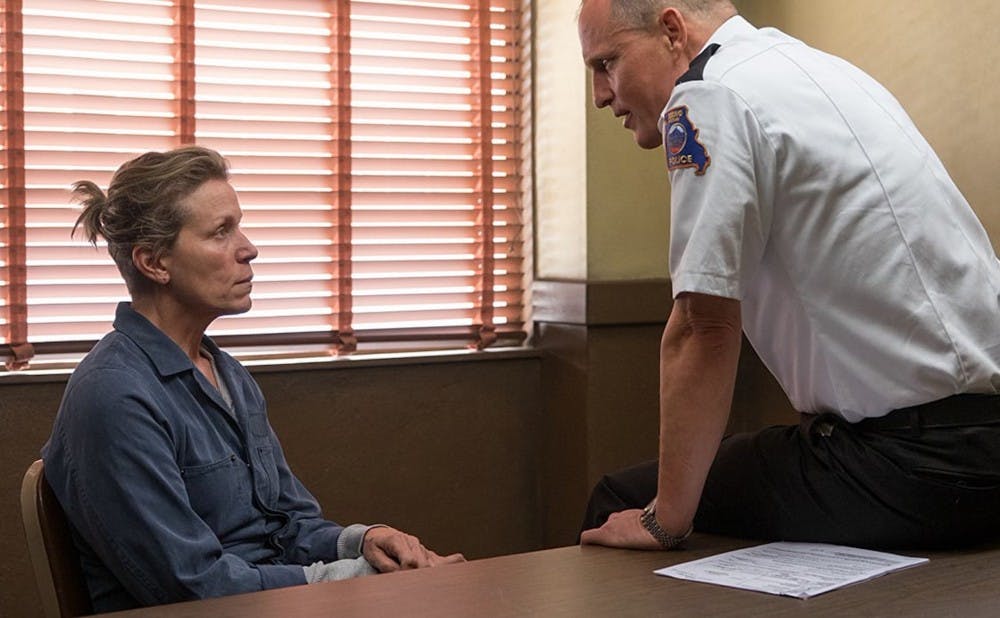"Rightly to be great / Is not to stir without great argument, / But greatly to find quarrel in a straw / When honour's at the stake.” - William Shakespeare, “Hamlet,” Act IV, Scene 4
It’s been seven months since Mildred Hayes (Frances McDormand) last heard from the police department in her small town of Ebbing, Missouri. Considering the recently decreasing level of trust between police and the general public, most people would appreciate minimizing their interactions with police. Not Mildred Hayes. Her 16-year-old daughter, Angela, died in a gruesome act of violence, and there still haven’t been any arrests. To Mildred, the police department’s inaction is reprehensible. Driving home one day along a road surrounded by overgrown weeds, she spies three abandoned billboards, each about 50 yards apart, still bearing the faded panels of beauty product and baby care advertisements. The advertisement company she contacts doesn’t even remember those three billboard locations, but Mildred is willing to pay for a year-long rental. She posts three separate messages, black text on a solid red background, each condemning Ebbing’s police chief Bill Willoughby for letting Angela’s case go cold. Together, the billboards loom over the country landscape, 20-foot-high obelisks of a mother’s tenacious battle for justice.
Of course, this action causes more problems within this small town, and soon after the billboards gather media attention, Mildred finds herself making unlikely enemies. The director and writer of “Three Billboards Outside Ebbing, Missouri,” Martin McDonagh (“In Bruges,” “Seven Psychopaths”), gravitates toward some of the darkest reaches of the psyche, but his knack for uncovering the humanity in his most depraved characters sets him apart from other filmmakers. McDormand does an excellent job playing the disgruntled, short-tempered Mildred. Her presence onscreen is awe-inspiring, her icy glare disarming everyone who stands in her way. A flashback scene involving an argument between Mildred and Angela shows her grief-stricken, though not in the way she must have been the day she heard of her daughter’s death. No sobbing, no cursing at the sky. Instead, she stares at Angela’s untouched bedroom with the grief of resignation, her face barely echoing that past trauma.
Woody Harrelson provides an equally astounding performance as Chief Willoughby, whose positive energy initially seems alarming. For a man with a publicized personal attack against him, he’s relatively calm. His first meeting with Mildred could be described as “pathetic,” in a purely Greek sense; his pleas that there truly haven’t been any leads in her daughter’s case are met with scorn. It’s hard not to feel bad for him, especially given Harrelson’s fatigued demeanor. He’s a man of an older age who finally feels dragged down by the weight of the world (hell, even just his rural town), explained by a revelation halfway through the movie that shouldn’t be spoiled. Although Harrelson’s delivery becomes somewhat chipper toward the end of the movie—most disorienting amidst the movie’s increasingly dark tone—it serves to ground Willoughby as someone who cherishes the humor and joy in life.
Willoughby might not be a model policeman, but the rest of the Ebbing Police Department make him look like Andy Griffith. Unabashedly racist, bearingless and, worst of all, lazy, the EPD lounge around their windowed office, their inaction transparent to the public. The absolute worst of the officers is stubborn-headed Jason Dixon (Sam Rockwell), whose presence in the film undermines the comedic trope of the inept police officer. Instead of looking like Chief Wiggum, Dixon is terrifyingly willing to abuse his power. Each gag poking fun at Dixon (Dixon losing his badge, Dixon living with his mom, Dixon insisting he doesn’t partake in any “persons-of-color torturing”) simultaneously gives the audience room to laugh at those in power while reminding them that men and women just like Dixon actually work in police departments around the country. Rockwell’s performance merits praise for so convincingly bringing such a despicable character to life. I played a racist waiter in a musical last year, and I had the dubious honor of using the N-word on stage each night; in “Three Billboards,” Dixon says some of the most vile things I’ve ever heard, and Rockwell never feels like he’s holding back. His transformation over the course of the film, from ignorant and hateful to introspective and repentant, might be one of the most compelling in movie history.
Does Lucas Hedges have a guardian angel? His nomination for Best Supporting Actor in “Manchester by the Sea” last year baffled me, and his presence both in “Three Billboards” and Greta Gerwig’s “Lady Bird” seem to suggest he’s gunning for another nomination this year. In both movies, Hedges plays a prominent supporting character, and in both, he stinks. Here, he plays Mildred’s son, Robbie, who constantly begs his mom to stop fighting with the police. He says he can’t stand driving past the billboards every day, forced reminders of his sister’s horrific death; too bad I can’t believe any of it coming from Hedges. Also unbelievable: Abbie Cornish’s accent. She plays Willoughby’s wife, Anne, who in addition to being much younger than him is also Welsh. Actually, nobody mentions her country of origin, but her accent ebbs between Wales and the Deep American South. Her performance is so solid, however, that it’s easily forgivable.
As the stakes rise in “Three Billboards Outside Ebbing, Missouri,” the nature of the film’s essential question changes from “How do we seek out justice when the law fails us?” to “Is justice worth seeking at all?” And with McDonagh’s macabre sense of humor, each gruesome turn of fate is punctuated with moments of levity. The result: a movie that is in equal parts grave and hilarious. “Three Billboards” never once felt predictable, and it might be the most refreshingly original movie released this year.
Get The Chronicle straight to your inbox
Signup for our weekly newsletter. Cancel at any time.

